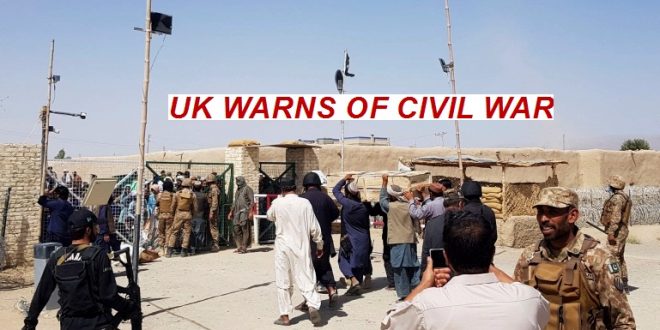14-08-2021
By SJA Jafri + Bureau Report
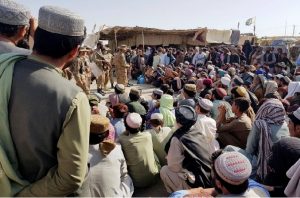 CHAMAN-SPIN BOLDAK BORDER/ ISLAMABAD/ KABUL: Pakistani forces have clashed with hundreds of Afghans stranded on Pakistan’s side of a commercially vital border crossing with Afghanistan after its closure by the Taliban, Pakistani security officials say.
CHAMAN-SPIN BOLDAK BORDER/ ISLAMABAD/ KABUL: Pakistani forces have clashed with hundreds of Afghans stranded on Pakistan’s side of a commercially vital border crossing with Afghanistan after its closure by the Taliban, Pakistani security officials say.
The disturbances broke out on Thursday after a 56-year-old Afghan traveller died of a heart attack as he waited in the dusty heat to enter Afghanistan via the Chaman-Spin Boldak crossing, Arif Kakar, a Pakistani official on the scene, told Reuters news agency.
Protesters carried his body to a local Pakistani government office demanding the border be reopened. Some began throwing stones at security forces, who responded by firing tear gas and charging the protesters with batons to disperse them. No injuries were reported.
The Chaman-Spin Boldak crossing is landlocked Afghanistan’s second busiest entry point and main commercial artery to the Pakistani seacoast.
The Taliban, which captured the crossing last month as part of a major advance across Afghanistan as US-led foreign forces withdraw, announced its closure on August 6 in protest at a Pakistani decision to end visa-free travel for Afghans.
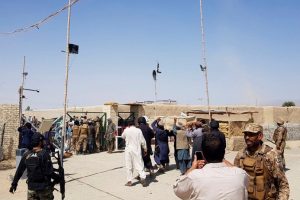 The Taliban is demanding Pakistan allow Afghans to cross the frontier with either an Afghan ID card or a Pakistani-issued refugee registration card.
The Taliban is demanding Pakistan allow Afghans to cross the frontier with either an Afghan ID card or a Pakistani-issued refugee registration card.
Taliban fighters have rapidly taken territory from the Kabul government in recent weeks, including important border crossings with Iran and Central Asian countries that now provide significant customs revenue for the group.
Some 900 trucks went through the Chaman-Spin Boldak crossing daily before the Taliban seized it.
Opening the border with Pakistan for visa-free travel would not only help the Taliban curry favor from Afghans but also shore up a route to areas of Pakistan that have housed Taliban fighters and some commanders.
Pakistan and the Taliban long maintained good relations though Islamabad says this ended after the 2001 United States-led invasion of Afghanistan that removed the group from power for having sheltered al-Qaeda fighters who carried out the September 11 attacks on the US.
Western capitals and the Kabul government say Pakistani support to the Taliban continues and many of its leaders enjoy safe haven in the country, an allegation Islamabad denies.
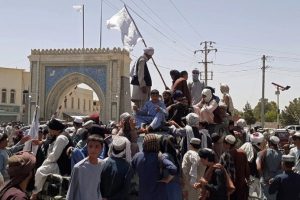 Meanwhile, the Taliban armed group takes the provincial capitals, Qalat, Terenkot, Pul-e Alam, Feruz Koh, Qala-e Naw and Lashkar Gah within hours after capturing Herat and Kandahar cities.
Meanwhile, the Taliban armed group takes the provincial capitals, Qalat, Terenkot, Pul-e Alam, Feruz Koh, Qala-e Naw and Lashkar Gah within hours after capturing Herat and Kandahar cities.
It so far has control over 18 provincial capitals across Afghanistan.
Afghanistan is tipping towards civil war and the West must understand that the Taliban is not a single entity but a title for a myriad of competing interests, the United Kingdom’s defence minister says.
“Britain found that out in the 1830s, that it is a country led by warlords and led by different provinces and tribes, and you end up, if you’re not very careful in a civil war, and I think we are heading towards a civil war,” Defence Secretary Ben Wallace tells media.
“The Taliban is not entirely a single entity, they break down underneath the title into all sorts of different interests,” Wallace said.
Afghanistan calls for UN Security Council meeting: Russia
The Russian foreign minister says the Afghan government has requested to summon a meeting of the UN Security Council over the deteriorating situation in the country where the Taliban made significant military advancements.
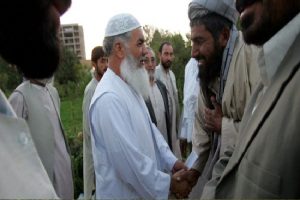 Speaking at a news conference in the Rostov Oblast region, Sergey Lavrov says such a meeting would be helpful if used to launch constructive talks between the Afghan sides.
Speaking at a news conference in the Rostov Oblast region, Sergey Lavrov says such a meeting would be helpful if used to launch constructive talks between the Afghan sides.
NATO meets over Western embassy staff reduction
NATO ambassadors are meeting to discuss the rapidly deteriorating security situation in Afghanistan and to coordinate national measures to reduce embassy staff in Kabul, a security source tell Reuters news agency.
The Western alliance has ended military operations in Afghanistan after almost 20 years and withdrawn most troops from the country but still serves as a forum to coordinate national measures there.
Afghan commander Ismail Khan captured in Herat
Taliban fighters have captured Ismail Khan, the veteran local commander leading militia resistance in Herat, local officials say.
“The Taliban agreed that they will not pose any threat or harm to the government officials who surrendered,” says provincial council member Ghulam Habib Hashimi.
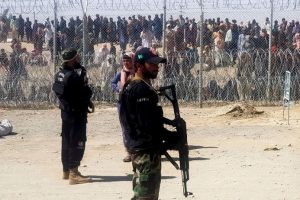 Khan, the most prominent militia commander and believed to be in his 70s, together with the provincial governor and security officials, were handed over to the Taliban under an agreement, Hashimi tells Reuters news agency. He has no details of the deal.
Khan, the most prominent militia commander and believed to be in his 70s, together with the provincial governor and security officials, were handed over to the Taliban under an agreement, Hashimi tells Reuters news agency. He has no details of the deal.
Khan’s capture, confirmed by Taliban spokesman Zabiullah Mujahid, provides one of the most potent symbols of the crumbling of resistance in the city.
Photos and videos showing the eminent commander apparently in the hands of the fighters were widely shared on social media although they could not immediately be verified.
Taliban captures the capital of Zabul province
Qalat, the capital of Zabul province in Afghanistan’s south, becomes the 18th city taken over by the Taliban, says Atta Jan Haqbayan, the provincial council chief in Zabul province.
He also says officials are in a nearby army camp preparing to leave.
Dutch may have to close Kabul embassy
The Dutch government says it may have to close its embassy in Kabul and is working quickly to bring back some of its local Afghan staff.
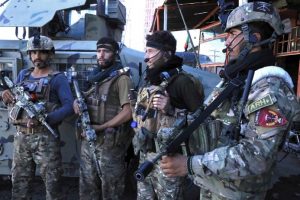 Foreign Minister Sigrid Kaag tells reporters in The Hague that the Netherlands intends to keep its embassy open as long as possible, but this could prove untenable if Kabul came under Taliban siege or was captured.
Foreign Minister Sigrid Kaag tells reporters in The Hague that the Netherlands intends to keep its embassy open as long as possible, but this could prove untenable if Kabul came under Taliban siege or was captured.
A spokeswoman for the Dutch foreign ministry confirms a drawdown of embassy employees is under way but would not say how many Dutch staff remained, citing security concerns.
“We are evaluating all options,” said Tessa van Staden.
Dutch broadcaster NOS cites Defence Minister Ank Bijleveld as saying that the number of Afghan translators and local staff to be evacuated amounted to “a few dozen”.
Here are the provincial capitals that have fallen to or are being attacked by the armed group, which is fighting to re-impose its rule after its government was toppled in 2001.
Bismillah Jan Mohammad and Qudratullah Rahimi, two lawmakers from Afghanistan’s southern Uruzgan province, say local officials have surrendered Terenkot, the provincial capital, to the Taliban.
Mohammad says the governor is en route to the airport to depart for Kabul.
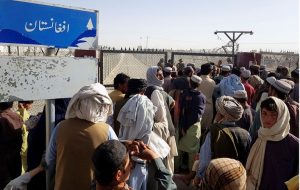 The United Nations refugee agency calls on Afghanistan’s neighbors to keep borders open as Taliban advances heightened the country’s crisis.
The United Nations refugee agency calls on Afghanistan’s neighbors to keep borders open as Taliban advances heightened the country’s crisis.
“An inability to seek safety may risk innumerable civilian lives. UNHCR stands ready to help national authorities scale up humanitarian responses as needed,” a spokesperson for the agency says at a briefing in Geneva.
The World Food Programme sees food shortages in Afghanistan as “quite dire” and worsening, a spokesperson adds, saying the situation had all the hallmarks of a humanitarian catastrophe.
The Taliban overruns the city of Pul-e Alam, the capital of Afghanistan’s central province of Logar, about 80km (50 miles) away from the national capital Kabul, officials say.
The armed group takes the governor and the head of the city’s spy agency captive, after securing government buildings, according to local councilor Hasibullah Stanakzai and a member of Afghan parliament representing the province, Huma Ahmadi.
A source close to the governor’s office confirms the takeover to Al Jazeera, saying that provincial governor, Abdul Quayom Rahimi fought for 12 hours, but did not receive the back-up, including air support, he requested.
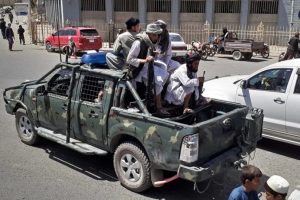 The source says that up to 200 Taliban fighters stormed the governor’s compound, killing members of the security forces on their way into the compound.
The source says that up to 200 Taliban fighters stormed the governor’s compound, killing members of the security forces on their way into the compound.
The governor was given a warning to turn himself over or the entire compound would come under attack. He surrendered.
Germany must forgo bureaucracy to enable local staff who worked for its military in Afghanistan to leave the country quickly, Interior Minister Horst Seehofer says.
“The situation in Afghanistan is becoming increasingly threatening,” he says in a statement.
“Whether charter flights or issuing visas after arrival in Germany, I support all measures that enable our local support staff and their families to leave the country quickly.”
“There is no time for bureaucracy, we must act,” he says.
 Pressmediaofindia
Pressmediaofindia
